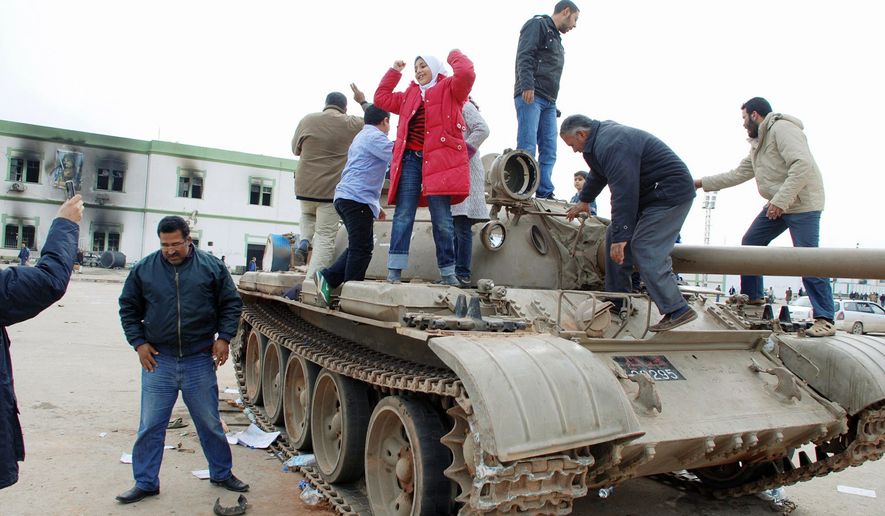The United States on Monday demanded an end to the “unacceptable bloodshed” in Libya with violence spreading in Tripoli, as Moammar Gadhafi appeared to be losing his iron grip on his oil-rich nation as it became swept up in the Arab uprisings gripping the Middle East.
“The world is watching the situation in Libya with alarm,” Secretary of State Hillary Rodham Clinton said in Washington. “We join the international community in strongly condemning the violence in Libya.
“Now is the time to stop this unacceptable bloodshed. Our thoughts and prayers are with those whose lives have been lost, and with their loved ones.”
The State Department ordered the evacuation of families and nonessential staff from the U.S. Embassy in Tripoli.
Col. Gadhafi, who has ruled Libya for 42 years, lost more diplomatic support Monday as a top Libyan envoy at the United Nations demanded he resign and be put on trial.
“If he doesn’t [resign], the Libyan people will get rid of him,” Deputy Ambassador Ibrahim Dabbashi warned. “We also call on the prosecutor of the International Criminal Court to investigate the crimes against humanity committed by Gadhafi against the Libyan people.”
On Sunday, the Libyan ambassador to the Arab League, Abdel Moneim al-Honi, quit, saying, “I am joining the ranks of the revolution.”
Justice Minister Mustafa Abdel-Jalil also resigned this week. He said he was leaving to protest the “excessive use of force” against unarmed demonstrators, according to the pro-government news website Qureyna.
“The justice minister is someone who has long been at odds with the government and the security forces. … I fear for his safety,” said Sarah Leah Whitson, Middle East and North Africa director at Human Rights Watch.
One Libyan dissident in the United States, who asked not to be identified, told The Washington Times that people in Libya are afraid to speak to reporters because “they could be dead five minutes later.”
She said Col. Gadhafi’s regime blocked communications in Tripoli and that cell phones and land lines appeared to have been disrupted at some point Monday.
Videos posted online showed the extent of the regime’s brutal crackdown in Benghazi and Tripoli. The images appear to confirm claims that the regime has used anti-tank artillery against unarmed protesters.
“In Benghazi, the streets are strewn with body parts because of the heavy artillery that was fired,” another female dissident, who also asked to remain anonymous, told The Times.
She said friends in Libya told her that snipers had shot protesters and anyone who attempted to retrieve the bodies. Several dissidents contacted by The Times said the regime has injected foreign mercenaries — flown in on helicopters and loaded in trucks — into the unrest in an attempt to crush the protests.
A third dissident said similar repression by the regime only served to harden the resolve of the residents of Benghazi, now under the control of protesters and rebel soldiers who said they “liberated” Libya’s second-largest city from government forces on Sunday.
“What is happening is a war crime,” he said of the violence in Tripoli.
The dissident said the bloody crackdown in Tripoli is evidence that Col. Gadhafi is aware of the significance of the fall of the capital.
“He knows that if he loses Tripoli, he loses Libya,” the dissident said.
Human Rights Watch put the death toll across the nation at more than 234.
“A potential human rights catastrophe is unfolding in Libya,” said Ms. Whitson.
“Libya is trying to impose an information blackout, but it can’t hide a massacre.”
British Prime Minister David Cameron, on a visit to Egypt, called the Libyan government’s crackdown “appalling.”
“The regime is using the most vicious forms of repression against people who want to see that country, which is one of the most closed and one of the most autocratic, make progress,” he told reporters in Cairo.
U.N. Secretary-General Ban Ki-moon had a 40-minute telephone conversation with Col. Gadhafi on Monday, according to Mr. Ban’s office.
“The secretary-general expressed deep concern at the escalating scale of violence and emphasized that it must stop immediately. He reiterated his call for respect for basic freedoms and human rights, including peaceful assembly and information,” according to a readout of the phone call from Mr. Ban’s office.
A radical Muslim cleric, Yusuf al-Qaradawi, issued a fatwa, an Islamic legal finding, against Col. Gadhafi, saying that any Libyan soldier could kill the dictator “to rid Libya of him.”
In Libya, warplanes swooped low over Tripoli in the evening and snipers took up position on roofs, apparently to stop people outside the capital from joining protests, said Mohammed Abdul-Malek, a London-based opposition activist in touch with residents.
State TV quoted Col. Gadhafi’s son, Seif al-Islam, as saying the military carried out air strikes on remote areas, away from residential neighborhoods, on munitions warehouses, denying reports that warplanes attacked Tripoli and Benghazi.
Col. Gadhafi, whose whereabouts were unknown Monday, appeared briefly on TV on Tuesday to dispel rumors that he had fled. Sitting in a car in front of what appeared to be his residence and holding an umbrella out of the passenger side door, he told an interviewer that he had wanted to go to the capital’s Green Square to talk to his supporters, but the rain stopped him.
“I am here to show that I am in Tripoli and not in Venezuela. Don’t believe those misleading dog stations,” he said, referring to the media reports that he had left the country.
• This article is based in part on wire service reports.
• Ashish Kumar Sen can be reached at asen@washingtontimes.com.




Please read our comment policy before commenting.